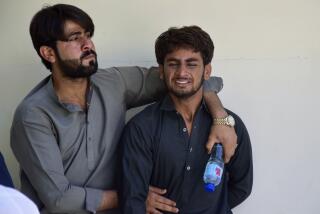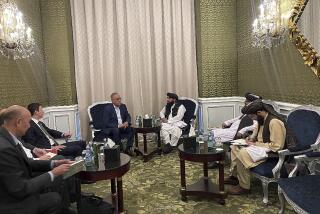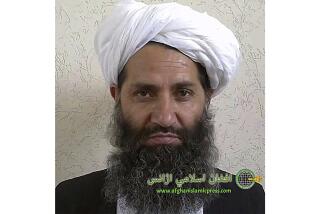In show of unity, top Pakistanis meet and denounce U.S. charges
Pakistani political leaders meeting Thursday in the capital denounced U.S. allegations that the country’s premier spy agency assisted insurgents in attacking American targets in Afghanistan, but also stressed the need to keep lines of communication open with Washington.
The meeting of more than 50 politicians from a broad spectrum of parties, along with military and intelligence chiefs, was meant to convey Pakistan’s unity amid fear that the United States will attack tribal areas along the Afghan border where Afghan Taliban militants maintain strongholds.
U.S. officials have tried to tone down the rhetoric coming from Washington since Adm. Michael G. Mullen’s blunt charge last week that the Haqqani network, which has ties to the Taliban, was “a veritable arm” of Pakistan’s Inter-Services Intelligence agency, or ISI.
The chairman of the Joint Chiefs of Staff accused the ISI of helping Haqqani militants carry out a 20-hour siege of the U.S. Embassy in Kabul, the Afghan capital, on Sept. 13, as well as a truck bombing in Wardak province three days earlier that injured more than 70 American troops.
Since Mullen’s remarks, U.S. officials have called upon Pakistan to take action against Haqqani militants enjoying sanctuary in Pakistan’s North Waziristan tribal region. But they have yet to lay out what options they would be likely to pursue if Islamabad did not meet U.S. demands.
Nevertheless, many Pakistani commentators and politicians have said the country should brace itself for a possible attack by U.S. forces.
At the opening of Thursday’s conference, Prime Minister Yousuf Raza Gilani stressed the country’s resolve “to defend the sovereignty, independence and territorial integrity of our sacred motherland.”
“Pakistan is proud of its armed forces, and has full confidence in their capabilities for ensuring national defense.”
After nine hours of talks, officials released a resolution “rejecting the recent assertions and baseless allegations made against Pakistan,” said Information Minister Firdous Ashiq Awan, reading the document on state television. “Such assertions are without substance and are derogatory to a partnership approach.”
Analysts cautioned that ultimately it is the country’s powerful military, led by army chief Gen. Ashfaq Kayani, and not the civilian government, that establishes foreign policy, particularly when it comes to relations with the U.S. and the 10-year conflict in Afghanistan.
The conference, said security analyst Hasan Askari Rizvi, “will not decide policy toward the U.S.”
“There will be fiery speeches, and they’ll formulate a resolution, but it won’t have any implications on Pakistani foreign policy.”
Pakistan has dismissed repeated U.S. demands that it uproot Haqqani militants, asserting that it has already mounted extensive military operations against Taliban strongholds in surrounding tribal areas and that its forces are now overstretched.
However, analysts and former Pakistani military commanders say Islamabad resists because it sees Afghan Taliban elements as a useful hedge against India’s interests in Afghanistan.
Estimated to number more than 10,000 fighters, the Haqqani network has strong ties to Pakistan’s military and intelligence community that stretch back 30 years to the time when Pashtun warlord Jalaluddin Haqqani organized fighters against Soviet troops in the 1980s. Now in his late 50s, Haqqani has delegated authority over his network of fighters to his son, Sirajuddin Haqqani.
The group moves freely between Afghanistan’s eastern provinces and havens in North Waziristan, where it has been left untouched by Pakistan’s military but has been targeted heavily by U.S. drone missile strikes.
More to Read
Sign up for Essential California
The most important California stories and recommendations in your inbox every morning.
You may occasionally receive promotional content from the Los Angeles Times.








